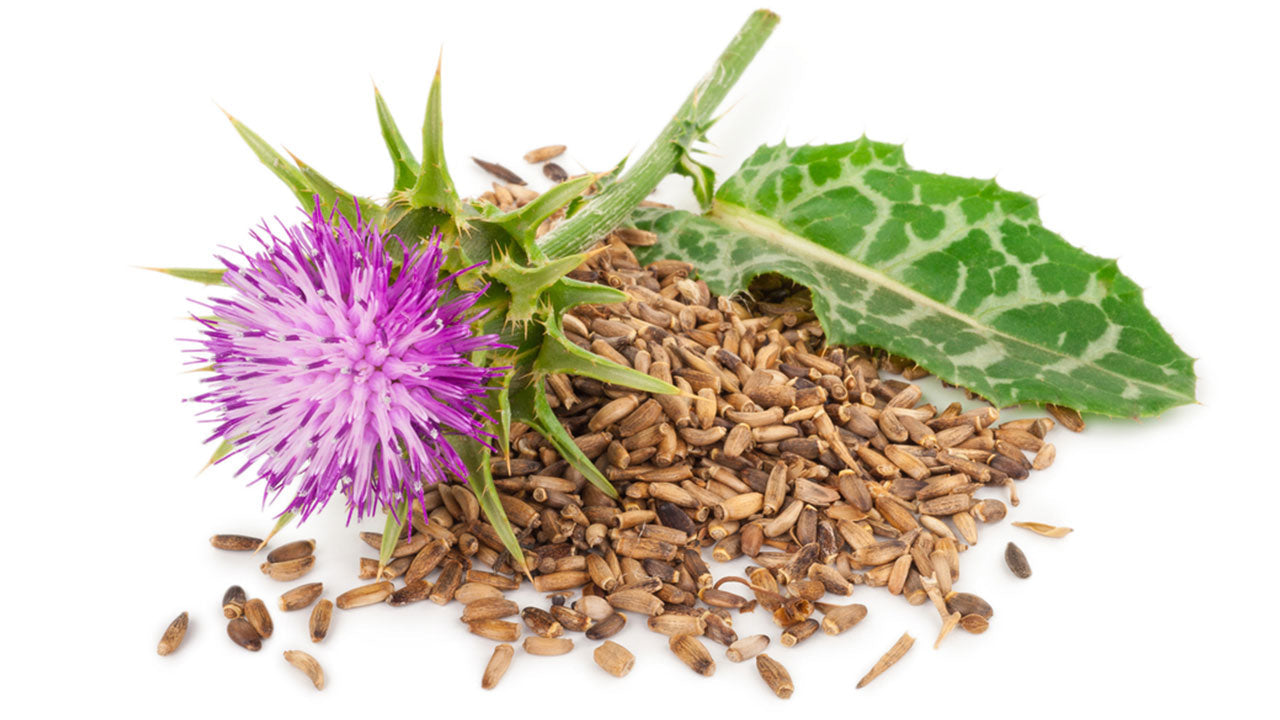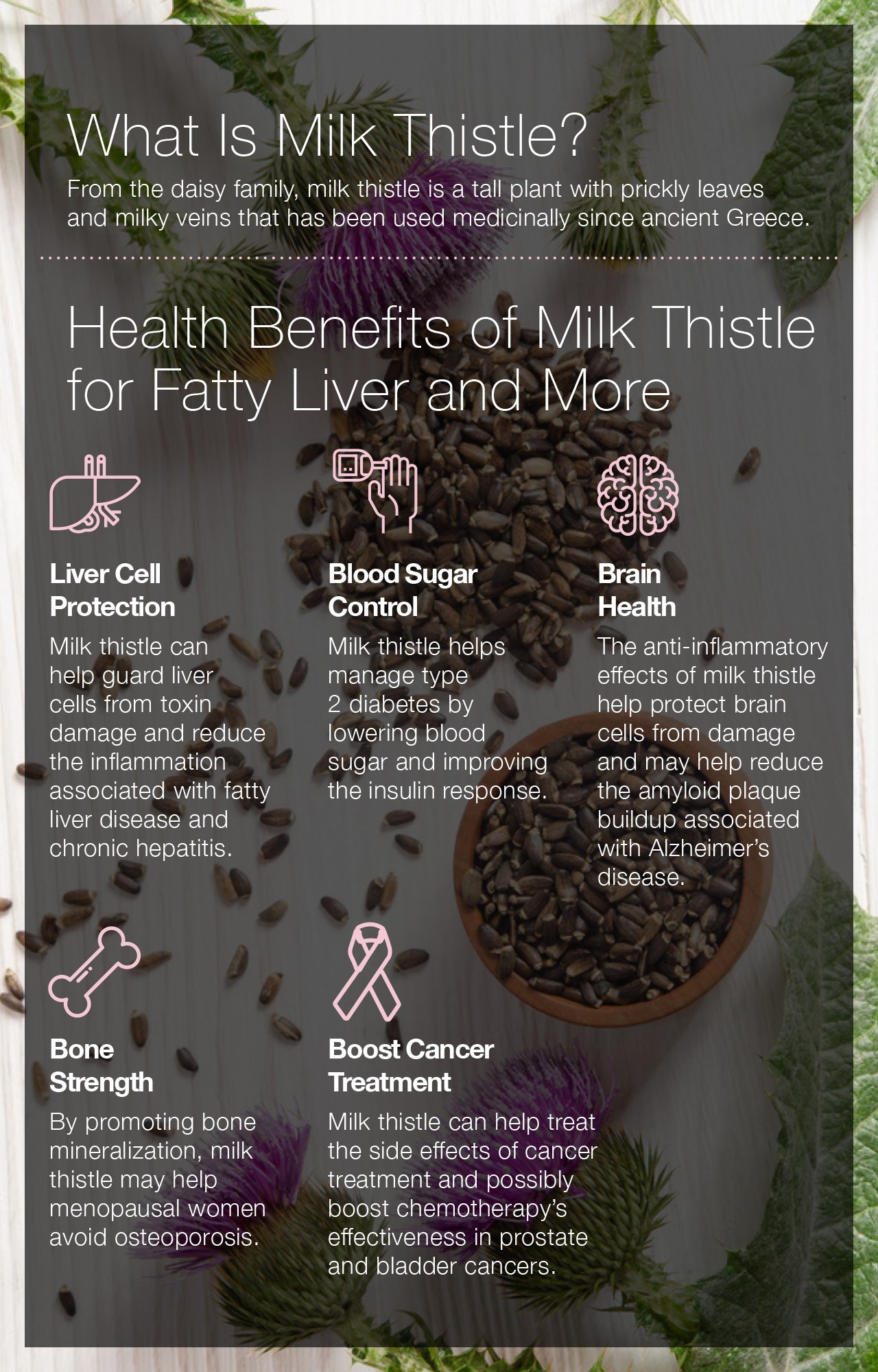Milk Thistle for Fatty Liver Disease and More
 By: by Amino Science
By: by Amino Science

Milk thistle, scientific name Silybum marianum, also known as bull thistle, holy thistle, lady's thistle, silibinin, and silymarin, is an herbal remedy that's held strong throughout the ages. Data shows that supplementing with milk thistle helps promote liver function and detox, causing many to wonder if it would be beneficial to use milk thistle for fatty liver disease. We have the details on milk thistle and the scientific findings behind its health benefits so you can see the connection for yourself.
What Is Milk Thistle?
From the Asteraceae or daisy family of plants, milk thistle is native to northern Africa, Asia, and Europe, but has since been naturalized in Australia and North and South America. It can grow as tall as 10 feet with big, prickly leaves, on which there are "milky veins." Its sap is also milky in appearance. It produces gray and black mottled fruits that are used to make milk thistle extract.
The name has a biblical origin. It's said that the milky veins of the plant came from a drop of the Virgin Mary's breast milk as she hid among the prickly plants to nurse baby Jesus. The medicinal use of the plant is even older than that story, however, and it was first described in writing by Greek physician Dioscorides.
It has been used as a liver aid since that time, good for "carrying off the bile" according to Pliny the Elder, though it was also used to treat snakebites, jaundice, varicose veins, and kidney, spleen, and liver obstructions. When the leaves are de-spined, the plant can also be consumed as a vegetable, and its flower can be eaten much like an artichoke.

Health Benefits of Milk Thistle for Fatty Liver and More
Researchers have tested milk thistle's antimicrobial, anti-inflammatory, and anti-diabetic effects, but it's still best known for its ability to help manage liver disease, including alcoholic fatty liver disease, nonalcoholic fatty liver disease (NAFLD), nonalcoholic steatohepatitis (NASH), and viral hepatitis. Here are the scientific findings backing up the most impressive claims of this dietary supplement.
1. Liver Cell Protection
Liver conditions like fatty liver disease and chronic hepatitis can lead to liver cancer, liver failure, and even death if left untreated or if they progress too far. Even under a health care provider's supervision, milk thistle is often used as a complementary therapy to improve liver health and function.
The effect of silymarin serves to guard liver cells against toxins and poisonings, protect against liver damage from inflammation caused by oxidative stress and free radicals, and increase the life expectancy of those with cirrhosis of the liver.
When it comes to a condition like fatty liver disease, taking milk thistle won't necessarily reduce the risk factors of developing NAFLD or alcoholic liver disease (proper diet, healthy weight loss, and lifestyle changes are required for that), but it can help you recover from liver injury and live to see another day. Luckily the liver is unique among organs due to its ability to heal (the same cannot be said for damage done to the brain or the heart), so if milk thistle helps to bring you back from the brink, your liver may yet recover.
2. Blood Sugar Control
Aside from being a defender of the liver, milk thistle also helps manage type 2 diabetes. Milk thistle contains compounds that work much like diabetic medication to decrease blood sugar levels and improve insulin resistance.
One meta-analysis on silymarin found that people who routinely take the supplement have a significant reduction in HbA1c (an important measure of blood sugar control) and fasting blood sugar levels. Those results on top of milk thistle's known anti-inflammatory abilities make it an asset to the body's defense against damage from diabetes, including complications such as kidney disease.
3. Brain Health
Milk thistle has also positively impacted neurological conditions like Parkinson's and Alzheimer's disease. Unnecessary inflammation can exacerbate age-related mental decline, and not only has milk thistle been shown to have anti-inflammatory properties, but those effects have specifically been studied on brain cells.
Animal studies of Alzheimer's have shown that milk thistle helps reduce amyloid plaque formations in the brain, the buildup of which interrupts the communication between the brain's nerve cells. Amyloid plaque buildup is one of the characteristic markers of Alzheimer's disease.
4. Bone Strength
The effects of milk thistle go bone-deep, specifically in helping to prevent osteoporosis. The progressive bone loss associated with osteoporosis causes skeletal fragility, making minor falls potentially life-threatening if they result in a fracture.
In both test tube and animal studies, milk thistle has been found to promote bone mineralization, an indication that it could help protect against bone loss, especially in postmenopausal women who are more prone to the condition. While human studies are not yet available to confirm these findings, it's nevertheless a promising indication.
5. Boost Cancer Treatment
There are indications that the antioxidant effects of milk thistle include anti-cancer properties that could help those receiving treatment. Further studies show that milk thistle may help reduce the side effects of chemotherapy treatments and other cancer therapeutics, including cancer cachexia. It may even help make chemotherapy work more effectively to destroy certain cancer cells like prostate cancer and bladder cancer.
Milk Thistle: Dosing and Safety
Milk thistle dosage for fatty liver and other conditions may be safe up to 420 milligrams per day for up to 41 months according to clinical trials, but it's always recommended that if you're using milk thistle to treat or supplement a known medical condition, you should consult with a health care professional before adding anything to your diet that could interact with your medication. Contraindications include:
- Anyone who is allergic to the Asteraceae or Compositae family of plants
- Those with hormone-sensitive conditions like uterine fibroids, endometriosis, and uterine, breast, or ovarian cancers
- Individuals with GI disorders, as milk thistle may cause changes in bowel habits, stomach upset, flatulence, dyspepsia, or diarrhea
- Pregnant women due to the lack of research done on this population
- Diabetic patients should consult their doctor first, as milk thistle's effect on blood sugar may lower it too much
While milk thistle is safe enough for human use in clinical trials, keep in mind that the United States Food and Drug Administration (FDA) does not closely regulate dietary supplements. Again, ask a trusted health care professional if you have any questions about the safety of the milk thistle product you choose.
And if you're looking for nutraceuticals with proven efficacy for fatty liver disease, then look no further than essential amino acids. Click here to learn how essential amino acids can protect against and reverse fatty liver disease, and get your essential amino acid supplements here.

Modern Uses for an Ancient Remedy
Milk thistle has been used medicinally for centuries, and today it can help prevent modern ailments and boost cutting-edge treatments for liver disease, diabetes, osteoporosis, and even cancer. Ask your doctor if milk thistle could help you recover and thrive.

Up to 25% off Amino
Shop NowTAGS: liver natural cures
Join the Community
Comments (0)
Most Craveable Recipes




 833-264-6620
833-264-6620



















